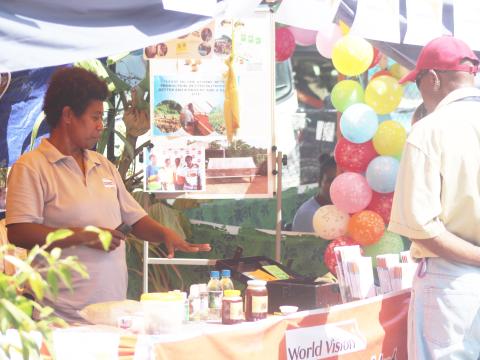World Vision Solomon Islands commits to the food day theme 'leave no one behind'.


World Vision Solomon Islands (WVSI) joins the other agencies in the country to mark World Food Day.
Today's event began with a parade from the Honiara City Council (HCC) compound to Town Ground, West of Honiara.
The theme for this year is "Leave no one behind." For WVSI, the team is relevant and committed to working to ensure no one is left behind in terms of quantity and quality of food.
As part of the commitment, WVSI is currently implementing a nutrition project at ten communities in the Southern, Northern, and Central Regions of Malaita Province. The International Fund for Agriculture Development (IFAD) funded project is called Melanesia Rural Market and Innovation-Driven Development Programme (MERMAID).
WVSI is serious about the project to ensure no one in the ten communities is left behind because a recent assessment conducted by World Vision Solomon Islands and its partners found a need for improvement, especially on consumption patterns.
Specifically, on food consumption patterns in 122 households of the ten communities, only 37% practice the minimum dietary diversity recommended for infant and young child feeding practices.
The assessment also found that less than 50% of the 122 households surveyed were experiencing moderate to severe food insecurity, with a significant number of households worrying about food.
The availability and source of the foods varied with the food item and community. The least diversity was noted for grains, while the seasonal availability gaps were mainly identified for nuts. Interestingly, the assessment also identified a wide range of food across the communities, with fruits, vegetables, and animal-source foods having the highest diversity.
The availability of food items like chicken, pork, milk, and onions corresponded to the community's needs such that they were available and used in large quantities during community events. While for others like peanuts, cabbage, Chinese cabbage, mangosteen, rock melon, soursop, and potera, availability was limited as only a few households produced them.
Notably, the regions had various similarities, and the results corresponded with the household food priorities obtained in the baseline FGDs. Therefore, they created one calendar for Malaita while validating the seasonal food availability calendars. The exercise included identifying the planting seasons for various crops that were unclear to the FGD participants. As well as explore the gap between availability and consumption, given the low dietary diversity observed in the household survey.
At the community level, the calendars provide a range of foods used to create a healthy food plate every year. The least diversity was mainly for the grain food group, while seasonal availability gaps were the legume and nuts group. These combinations must be participatory and developed to capture possible household-level factors related to the seasons, labour, income, and community/cultural ceremonies and address the availability gaps noted for grains and nuts.
World Vision and its partners, which involved the Alliance of Bioversity International and CIAT with support from the International Fund for Agricultural Development (IFAD), conducted the assessment towards the end of 2021. The survey was also conducted in Tafea Province of Vanuatu to " establish scalable pathways for increased consumption of local, nutritious foods, and improved incomes." The survey included three methodologies: Household Survey, Baseline Focus Baseline focus group discussions on information channels and household food priorities, and focus group discussions on food availability and accessibility.
The assessment findings are vital for World Vision's MERMAID Project in its effort to promote the consumption of a healthy diet as it clearly shows the foods available within the communities from household production, markets, and the wild. The snapshot of the local seasonal foods would be essential to identify combinations of foods that make a diverse food basket by households throughout the year.
The assessment will also help guide the project's work to ensure no one is left behind.
Apart from MERMAID Project, WVSI is also implementing other livelihood projects like Market Linkage Phase II, which focuses on fish, Coconut Crush Mill, Cocoa, Honey, and other commercial activities. The Central Islands Livelihood Project (CLIP) also focuses on fish and agriculture, while the Youth Social Entrepreneurship Development Project (YSED) focuses on piggery, honey, poultry, and farming. The BIOPAMA project, on the other hand is working with a conservation site, especially on the livelihood component.